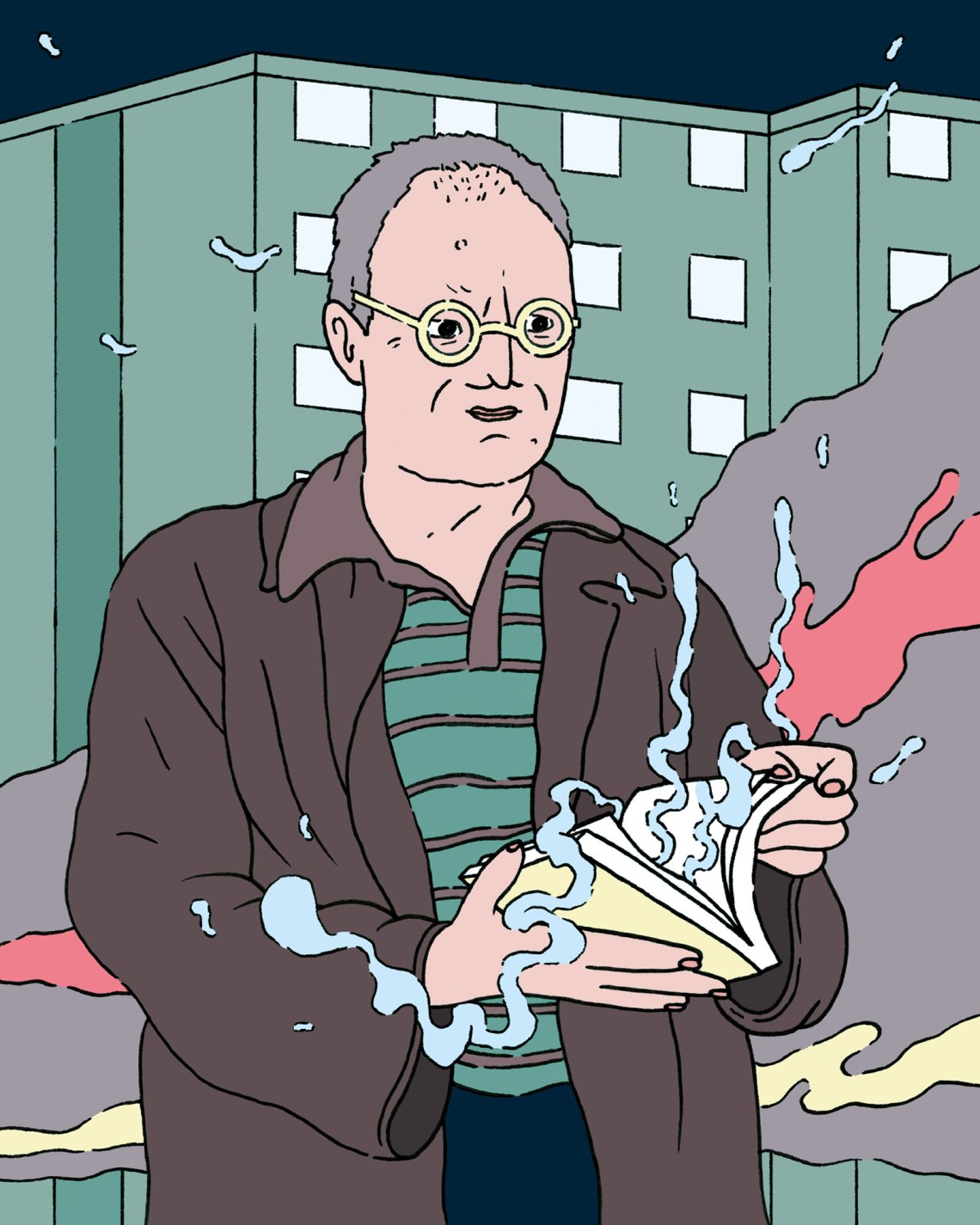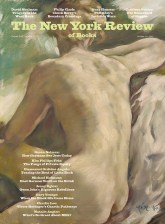It’s occurred to me from time to time that the experience of Hell would be like going around a world’s fair of national humor. In an especially bleak place, there would be German humor. This would be chiefly the inflicting of pain, toilets, and schadenfreude. Young man, remorseless masturbator, slips on some ejaculate, falls down a stairwell, breaks both his arms and legs, and newly immobilized (and infantilized) must have his bottom wiped by his mother. That kind of thing. (The instance is from Thomas Brussig’s novel Heroes Like Us.) Oh, reader, how I guffawed. The German weekly Der Spiegel, not known for its humor, getting wind of the new translation of Brussig’s The Short End of the Sonnenallee, and of Jonathan Franzen and Brussig doing a promotional reading tour together, suggested it was as though Metallica had agreed to open for Die Ärzte, a particularly low-minded group from Berlin, and play only cover versions of their songs. Maybe so.
Thomas Brussig was born in 1964 in East Berlin. He thus experienced something of the separate reality of East Germany, but not enough to co-opt his outlook or wreck his life. (Like the Altkanzler Helmut Kohl, though in a different way, he enjoyed the Gnade der späten Geburt, the “grace of a late birth.”) He did his stint in the old East German Nationale Volksarmee, had several spells as a student (he eventually graduated in filmmaking in 2000), and worked as a cleaner and porter and museum guard. These experiences were his stock-in-trade later, when he became a novelist.
Brussig’s decade was the 1990s, nourished by the memory of East Germany, its end and its rapid and incomplete assimilation. In 1991, under the pseudonym Cordt Berneburger, he published his first, earnest, and realist novel Wasserfarben; it is the youth of East Germany that is described as “watercolored” or just plain watery. In 1995 he brought out the wacky-wanky Helden wie wir (Heroes Like Us; John Brownjohn’s translation came out in 1997), and in 1999 Am kürzeren Ende der Sonnenallee, now translated, with a speaking delay, as The Short End of the Sonnenallee. Both books were successful in Germany—a terrible sign, more often than not. (It’s only the man who really can’t write who has it said of him in a Tagesspiegel review, “The man can really write.”) They intertwined the silly and the topical, both qualities that were greatly in demand—and both were duly filmed, from Brussig’s cowritten scripts, and released in the same year, 1999. Sonnenallee seems so skimpy, and relies so heavily on shallow effects and ill-judged surprises, that I wonder if the film—which I haven’t seen—didn’t come first.
To borrow Brussig’s own expression, he was, and perhaps is, something of a “career teenager.” In a kind of riposte to or echo of midcentury American novels about discontented youth—Salinger, Plath, Philip Roth—he wrote about the frustrations of East German young people: educational, sexual, professional, social, familial. His books, the first one compassionate, the later ones capers, are centered on pulpy and indistinguishable half-grown youths. In the West, this was a dominant or at least a widely accepted trope; in the East, where society was not powered by youth and youth culture, it was an eccentric and possibly even a dissident move. (Hence, perhaps, Brussig’s pseudonym first time out.) It was absurd to think that young people might call the shots. Even sport was run by older cadres with hypodermics. The only problem was that this ruling society was on its very last legs. It was in office, but not in power. Its ridiculous Saxon leaders were drooling old men in shiny suits, dreaming of stag hunts.
The place that Brussig describes is late high East Germany, incontinent with references to Western technology (photocopy machines, a Walkman), Western music, Western clothes, Western languages. One feels almost sorry for the disco bouncer telling the Brussig character to wear different panties next time he shows up. (He is in jeans, he explains to the reader.) It was too late for bullying, and too late for dissidence. Besides, Brussig wanted to be a popular writer, with a readership in the West as well as the now unified East. His solution was to make his books chirpy and foolish, fit them with happy endings, and call them triumphs. Or pranks. All that remains of them now is a rubble of bad taste, ingratiation, and complacency.
The Short End of the Sonnenallee is about a little gang of teenage boys who live in a stub of a street that fetched up in the East when Berlin was divided. In Wasserfarben, the layout is described as follows:
I live in 409 Sonnenallee. The border crossing is seventy yards from my front door, and I expect the street continues on the other side. On our side, the lowest number is 371. 1–370 surely exist as well, but I’ve never seen them.
It is a pragmatic enough book, at least to begin with, dealing with school, national service, mopeds, and so forth. Micha Kuppisch’s wooing of the street beauty Miriam is one major plot point, his friend Mario’s shacking up with a painter called “the Existentialist” another, Frizz’s efforts to get hold of an expensive imported pressing of Exile on Main Street a third. We are sometime in the late 1980s.
Advertisement
Satire, comedy, invention—most of the established categories make no sense to me at all in the context of Brussig. One witless blank after another. He does silly names. He puns for Germany. He does fatuous gags, obsessions, schemes. There is a dreary and vainglorious mechanical persistence in him. Repeatedly, a possible end (a depressed girl must be cheered up) has to be attempted by impossible means. The hero must compose seven years’ worth of diary entries overnight, with the earliest entries written left-handed to give the impression of immature handwriting. A record album deflects a bullet. A letter has been lost in the death strip between the two sides of the border and has to be retrieved—by glue, by vacuum cleaner, “using an optical device constructed out of binoculars and a rifle scope,” and so forth. Because so little thought—or, I would say, none at all—has been given to probability or consistency, the reader of Sonnenallee is never remotely persuaded to suspend her disbelief, and turns the pages with a jaded “whatever” or “oh, who cares.” It’s of a piece with the old Eastern European adage: We pretend to work and you pretend to pay us.
Two paragraphs stood out for me in the translation. One is a description of something found in a customs hut that, one surmises, makes the heart of the old geeky 1970s hi-fi nut in Franzen go pitter-patter:
He threw back a sheet to reveal a confiscated Japanese four-component stereo system with three-way bass-reflex boxes, a huge receiver with station presets, AFC, separate bass and treble controls, manual modulation for every channel, selector switches for mono/stereo and ferric/chromium-oxide, any number of function and band-range buttons, and no fewer than four on/off switches.
The other is what Micha’s older brother Bernd comes out with when Mrs. Kuppisch asks about his time in the army:
Cherries gotta ruck up…. Lip off, first shirt’ll make you drop twenty. We’re hatting up, big evolution, company-grade Whiskey Charlie, we’re black on go-juice and the unit’s only thinking rack ops, and then some burn-bag second Louie hauls out the MGMs over chow. Not an issue for your two-digit midget, but your cherry’s gotta stay frosty. First shirt says hands out of the pants bunkers, and it’s GOFO time if you don’t want a smoking—three wake-ups at the bag-nasty section. If it gets to six, he says, we’ll give it a fix. Nobody’s getting sprung before spring, which POs the brass. I had a ninety-six coming, and some backhoe at Central cuts me down to a seventy-two. You know how long that lug nut’s gonna be pushing an ink stick?
There’s nothing especially—or maybe even remotely—East German about it, but it is briefly a rather striking performance in the Full Metal Jacket style.
But then perhaps the authenticity of the idiom (authentic Kansas!) doesn’t matter. Characters reverse themselves overnight: Are they blabbermouths or souls of discretion? Shy or well adjusted? Popular or deceitful? Naive or fearful? The tongue-tied hero suddenly asks Miriam, and she even agrees. She phones him the minute they get their telephone installed. Micha’s pro-Moscow mother drops her long-held plans for his further education. Really? Really? Really? The uncle from the West sheds thirty-six pounds in five weeks so that he can smuggle in a nice suit for his nephew. A pair of ladies’ shoes is smuggled in in a piece of Bild-Zeitung. (This is perfectly inconceivable; nothing was more hated and feared by the Eastern Obrigkeit than any form of Western newsprint.) There is materialist snobbery expressed among the young people regarding their music albums—“No Yugo shit, still less an Indian pressing”—but it is these stout productions, slabs of vinyl and cardboard as thick as a deep-dish pizza and weighing about as much as a discus, that I would sooner have between me and a border guard’s stray bullet than any lighter-than-air “genuine English pressing,” still in its cellophane. And with a double album, even more so.
All this goes well beyond inattentiveness or sloppiness into indifference. Why read a book put together with such flawless contempt? Why translate it? But people translate books in the teeth of all sorts of obstacles and few, for all sorts of reasons and none. Jenny Watson is a Germanist in the Midwest who teaches Brussig to her classes; Jonathan Franzen is perhaps bored with the US. Last I heard, the Midwest wasn’t a barrel of laughs either, so a case for importation?
Advertisement
Brussig offers untranslatable Kalauer, or puns. This is the man who made fun of Christa Wolf’s Der geteilte Himmel (Divided Heaven) with his own der geheilte Pimmel (the cured dong). In the present book, there is “entjungt” (a neologism given literally but not especially constructively as “deboyed”) for “entjungfert” (deflowered). “Micha” is his given name; his mother calls him “Misha.” (Misha, the Russian bear, was the mascot for the 1980 Moscow Olympics.) The English reader sees both versions—they look much the same, sound the same—and doesn’t really get it. This kind of blank experience goes on into the memorably awful last sentence: “Happy people have bad memory but rich memories.” It sounds like a botched takeoff of Tolstoy. German has one word (Gedächtnis) for the faculty, another (Erinnerung) for what is remembered. Sometimes the language is telling us, “Uh-uh, don’t touch this,” and then it’s probably worth listening.




